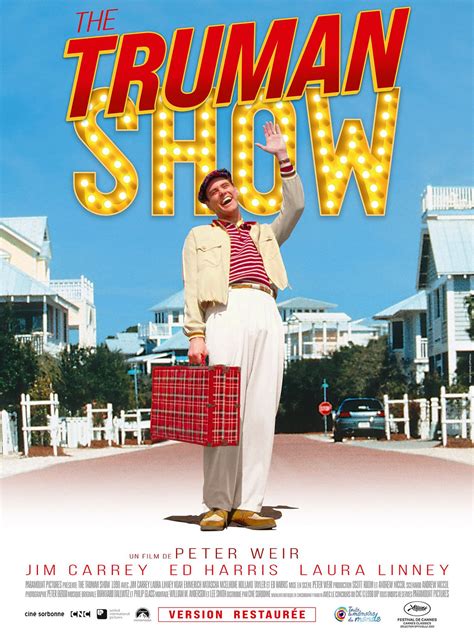The Truman Show

Description:
The Truman Show is a satirical science fiction psychological comedy-drama that follows the life of Truman Burbank, a man who has unknowingly been the star of a reality television show since birth. As Truman begins to notice odd occurrences and inconsistencies in his seemingly perfect town, he starts to question his reality and the authenticity of his life. The film explores themes of free will, privacy, and the impact of media on society, ultimately leading Truman on a journey of self-discovery.Keywords:
Surveillance, Reality, Existentialism, Media, Freedom, Utopia, SensationalismWhat is the point of the movie The Truman Show?
"The Truman Show" explores themes of reality, free will, and the nature of human existence. It follows Truman Burbank, a man unknowingly living in a constructed reality television show where his every move is broadcasted. The film critiques media manipulation and the ethics of entertainment, raising questions about authenticity and the impact of surveillance. Ultimately, it emphasizes the importance of personal choice and the quest for truth, as Truman seeks to break free from his artificial world to discover his true self.
What causes Truman Show syndrome?
Truman Show Syndrome, named after the film "The Truman Show," refers to a condition where individuals believe that their lives are being watched or broadcast, similar to the film's protagonist, Truman Burbank. This phenomenon can stem from a mix of psychological factors, including paranoia, feelings of being observed, and the impact of media on personal identity. It highlights concerns about privacy in an increasingly surveilled world and can lead to anxiety, depression, or a distorted sense of reality for those who experience it.
What's The Truman Show based on a true story?
"The Truman Show" is not based on a true story; it is a fictional film released in 1998, directed by Peter Weir and starring Jim Carrey as Truman Burbank. The film explores themes of reality, surveillance, and free will as Truman discovers that his entire life has been a televised reality show without his knowledge. While it reflects real societal concerns about media and privacy, its plot and characters are entirely invented. The film has sparked discussions about the ethical implications of reality television and media manipulation.
Is The Truman Show a happy ending?
Yes, "The Truman Show" can be considered to have a happy ending. In the film, Truman Burbank discovers that his entire life has been a constructed reality show, and he ultimately chooses to leave this artificial world in search of true freedom and authenticity. His decision to step out of the show represents personal empowerment and the pursuit of genuine happiness. While it involves leaving behind everything he knows, Truman's journey towards self-discovery and choice signifies a hopeful and liberating conclusion.
Explore More Categories: